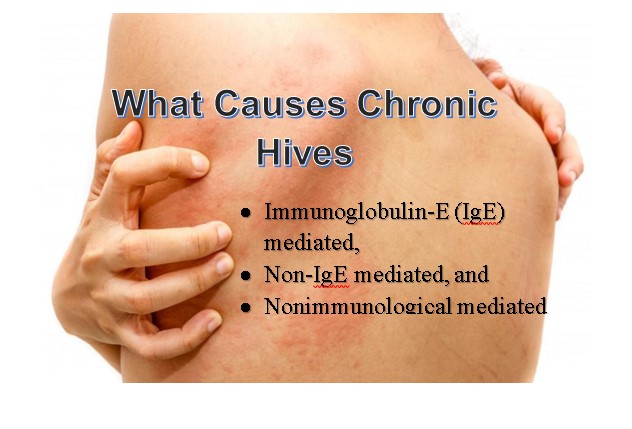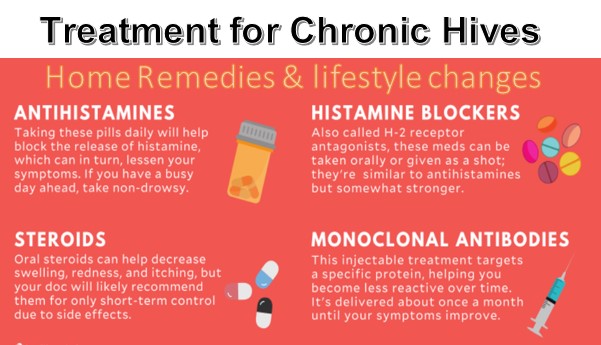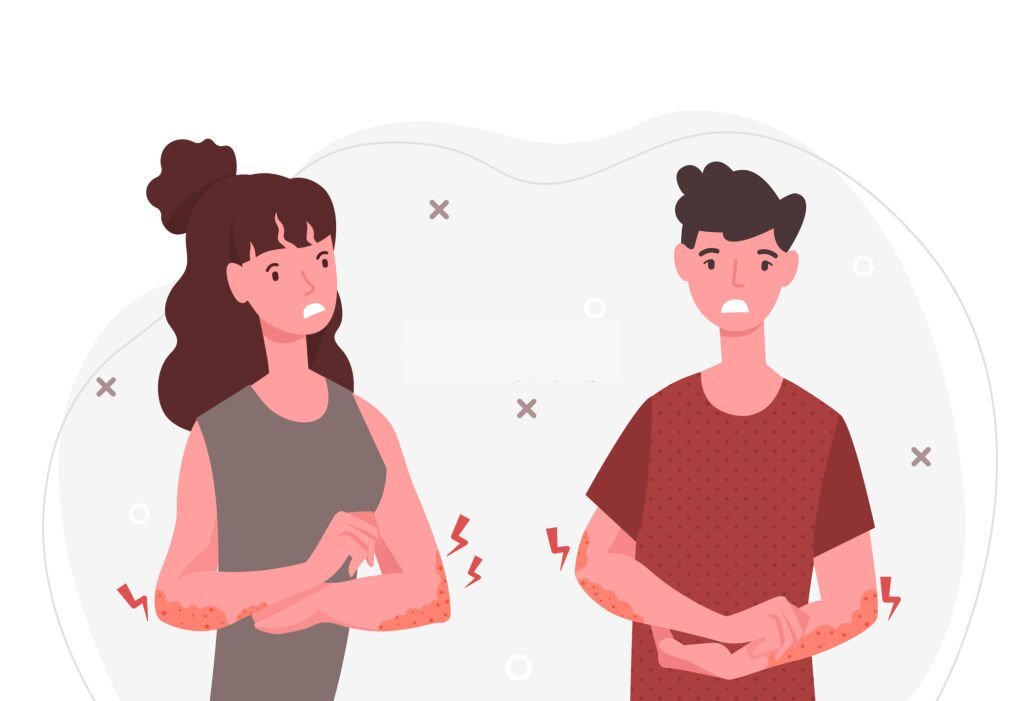What is chronic hives is a common question that many people have. This article will provide a brief guide to answers with what causes chronic hives, its triggers and treatment .
Having hive or allergy for more and longer time is called as chronic hives. Chronic hives is a skin condition characterized by an itchy rash that is typically worse at night. Learn what causes chronic hives and how to treat it.
This article will give you an insight into following points
- what is Chronic Spontaneous Urticaria,
- what causes chronic hives
- what is its pathophysiology,
- Triggers of chronic hives
- Management & treatment for chronic hives
What is Urticaria or Hives ?
Urticaria, commonly known as Hives, are hard to ignore. They emerge as patches of red, itchy, swollen, and painful skin that can be as small as a tiny pinpoint to as large as the size of a dinner plate.
These bumps or rashes can present anywhere in your body such as your face, arms, torso, back, and legs. About 20% of the population suffers from this type of itch.
Unfortunately, there is no definite cure for urticaria, which is why many Pharmaceutical and clinical research organizations are working on finding a novel treatment option. These researches are so many and on such a large scale that you will find more than one Chronic Urticaria Clinical Trials Near You.
WHAT IS CHRONIC SPONTANEOUS URTICARIA (CSU)?
Urticaria comes in episodes lasting over days or months. If the symptoms persist for less than six weeks then it is called “acute urticaria”.
Chronic Spontaneous Urticaria, or simply, Chronic Urticaria is when you have been suffering from these red, painful, itchy patches for more than six weeks.
Hence, the condition can be described as the “Presence of recurrent hives or swelling under the skin (angioedema), or both, for more than six weeks”.

The symptoms that you might experience if you have chronic urticaria include:
- Raised wheals or hives on your skin lasting for six weeks or more.
- Severe itching.
- Angioedema, which means swelling of your throat, eyelids, lips, and overall face.
- Excruciating pain.
- Fatigue and headaches.
- Palpitations or flushing.
The urticaria symptoms might range from mild to severe. Factors such as stress, sweat, or heat can aggravate these symptoms.
PATHOPHYSIOLOGY
There are multiple theories explaining different mechanisms of this condition. None of them are confirmed but the most widely accepted is the Autoimmune Theory which states that CSU is an autoimmune disease.
There will be increase in the release of histamine and other chemical mediators in the dermis (the second layer of skin) which then causes urticaria or allergic reactions
what causes chronic hives ?

- Immunoglobulin-E (IgE) mediated,
- Non-IgE mediated, and
- Nonimmunological mediated
Now we elaborate the chronic hives causes with brief description one by one.
Immunoglobulin-E (IgE) Mediated Causes:
Aeroallergens:
Air-borne substances which trigger an allergic reaction. These include pollen, pet dander, dust, etc.
Contact Allergens:
Any substance which triggers an allergic reaction when coming in contact with the skin is called a contact allergen. Most common of which is Nickel.
Food Allergens:
Edibles foods can be the cause that certain people are allergic to. For instance, peanuts, seafood, eggs, etc.
Insect Venom:
A poisonous secretion is transmitted through a bite or a sting.
Medications:
The most commonly known group of drugs to trigger an allergic reaction is beta-lactam antibiotics.
Parasitic Infections:
Infections are caused by parasites like protozoa, helminths, etc.
Non-IgE Mediated Causes:
Proteases:
Proteases (enzymes that break down proteins) are found characteristically in many allergens.
Bacterial Infections:
Infections are caused by different bacteria such as Helicobacter pylori, Streptococcus, mycoplasma, etc.
Autoimmune Diseases:
These diseases occur when your immune system starts attacking your body instead of protecting it. Some examples include thyroid disease, Sjogren’s syndrome, systemic lupus erythematosus, and rheumatoid arthritis.
Cryoglobulinemia:
It is a condition in which abnormal proteins are found over the blood. These proteins are thickened when exposed to cold temperatures and thus cause this type of allergy .
Fungal Infections:
These include, but are not limited to, mononucleosis, candidiasis, and other yeast infections.
Lymphoma:
Cancer of the lymphocytes (infection-killers of our immune system).
Viral Infections:
Some virus infection to us are prone to get the allergy. The Viruses like Epstein Barr virus, Hepatitis A/B/C, HIV, Rhinovirus, can be a cause of urticaria.
Vasculitis:
Inflammation of the vascular system of our body can be cause of it .
Non-immunologically Mediated Causes:
- Contact Allergen.
- Increase of Core Body Temperature.
- Food Pseudo Allergens (these are foods that contain histamine or salicylates, or trigger the production of histamine directly).
- Mastocytosis (overproduction of mast cells in body).
- Medications (Certain drugs that cause direct mast cell degranulation )
- Physical stimuli (cold, heat, pressure, vibration).
Despite having so many causative factors, 80 to 90% of Chronic Spontaneous Urticaria cases are idiopathic.
7 COMMON TRIGGERS OF CHRONIC HIVES
The seven most common things that can trigger a Chronic Spontaneous Urticaria reaction include:
- Allergies/allergic reactions
- Stress
- Certain foods
- Insect bites
- Pollen
- Animals/pet dander
- Extreme heat or cold temperatures
What is treatment for chronic hives?
Nettle rash has a significant impact on the lives of those who are affected. This condition can result in embarrassment, anxiety, sleep difficulties, and social isolation. It has an impact on your personal as well as professional life.
Hives have such an impact on people’s lives that they’re sometimes compared to the severity of ischemic heart disease in the elderly.

Therefore, precise diagnosis and management are essential. Let’s look at some medical and home treatments that may be able to aid you with your symptoms.
Home Remedies & lifestyle changes:
The first and foremost thing is to always stop yourself from scratching your itch. Instead, you can try some of these tips:
- Use a cold compress to soothe the inflammation. You can use a bag of frozen peas, an ice pack, or even just a cloth soaked in cold water.
- Try to find the things that trigger your symptoms and then avoid them at all costs.
- Take a lukewarm bath combined with some baking soda and colloidal oatmeal, which have anti-inflammatory properties, to help relieve your symptoms.
- Avoid tight and unbreathable clothes, instead wear loose-fit cotton or silk dress.
Medical Treatment:
You can also try some over-the-counter drugs or other medical treatments to help with your itch and rash, such as:
- Anti-inflammatory drugs.
- Anti Histamine Drugs
- Histamine Blocker Drugs
- Oral, systemic or topical corticosteroids.
- MOnoclonal Antibodies
- Omalizumab (preferred for those who have been suffering from hives for more than 12 years).
alternatives Hives treatments
- Hypnosis, meditation, yoga.
- Tai chi.
Even though there are a lot of options when it comes to the management of Chronic Spontaneous Urticaria, all of these options provide symptomatic relief and do not treat the condition.
To combat that problem, researchers, pharmaceuticals, and organizations are conducting clinical trials in different parts of the world.
ANAPHYLACTIC SHOCK in Chronic Hives
Anaphylactic shock is an uncommon yet life-threatening urticaria complication. It’s a potentially fatal reaction that occurs seconds or minutes after an allergic reaction is triggered by an allergen. Anything to which you are allergic could be the source of this trigger. Some or all of the symptoms listed below may occur during anaphylactic shock.
- Constriction of the chest.
- Swelling of the lips or tongue.
- Breathing difficulties.
- Dizziness.
- An unexpected feeling of tiredness.
- Loss of consciousness.
- Death.
Anaphylactic shock is a dangerous disorder that can kill you. Dial 911 and seek medical care right away if you or someone you know is suffering from anaphylactic shock.
Do not self-medicate with antihistamines; the sole therapeutic option is an epinephrine injection (epi-pen).
THE OUTLOOK
Chronic Spontaneous Urticaria is one of the most common dermatological conditions. The above discussion helps to know ” what is chronic hives ? ”
In the United States, it is estimated that over 500,000 individuals have CSU, the majority of whom are women or adults under the age of 40. In general, people of all ages and socioeconomic classes can be affected.
We, the general public, have a responsibility to help these people and work towards a better tomorrow. This can be accomplished by taking part and volunteering in Spontaneous Urticaria Clinical Trials. You can also take part in these trials if you participate in Clinical Research Studies near You.



